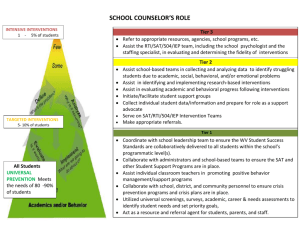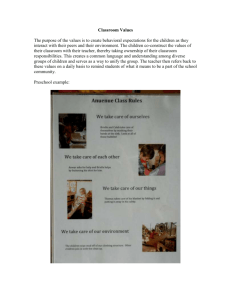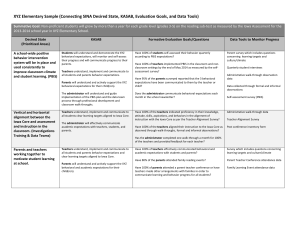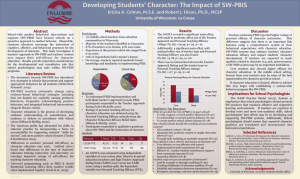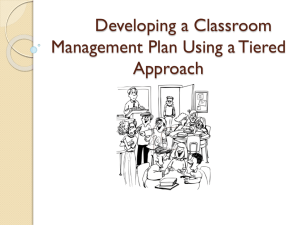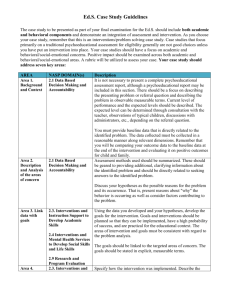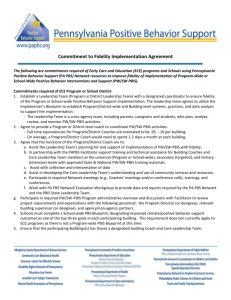(SW-PBIS) and Program-Wide Positive Behavioral Interventions
advertisement
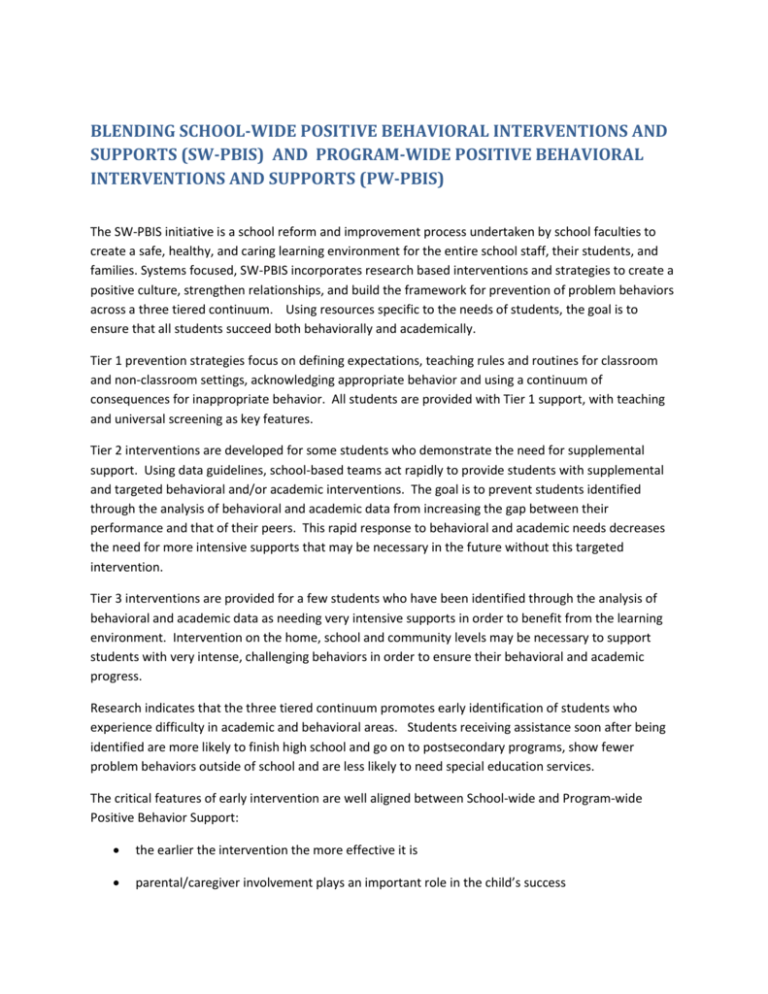
BLENDING SCHOOL-WIDE POSITIVE BEHAVIORAL INTERVENTIONS AND SUPPORTS (SW-PBIS) AND PROGRAM-WIDE POSITIVE BEHAVIORAL INTERVENTIONS AND SUPPORTS (PW-PBIS) The SW-PBIS initiative is a school reform and improvement process undertaken by school faculties to create a safe, healthy, and caring learning environment for the entire school staff, their students, and families. Systems focused, SW-PBIS incorporates research based interventions and strategies to create a positive culture, strengthen relationships, and build the framework for prevention of problem behaviors across a three tiered continuum. Using resources specific to the needs of students, the goal is to ensure that all students succeed both behaviorally and academically. Tier 1 prevention strategies focus on defining expectations, teaching rules and routines for classroom and non-classroom settings, acknowledging appropriate behavior and using a continuum of consequences for inappropriate behavior. All students are provided with Tier 1 support, with teaching and universal screening as key features. Tier 2 interventions are developed for some students who demonstrate the need for supplemental support. Using data guidelines, school-based teams act rapidly to provide students with supplemental and targeted behavioral and/or academic interventions. The goal is to prevent students identified through the analysis of behavioral and academic data from increasing the gap between their performance and that of their peers. This rapid response to behavioral and academic needs decreases the need for more intensive supports that may be necessary in the future without this targeted intervention. Tier 3 interventions are provided for a few students who have been identified through the analysis of behavioral and academic data as needing very intensive supports in order to benefit from the learning environment. Intervention on the home, school and community levels may be necessary to support students with very intense, challenging behaviors in order to ensure their behavioral and academic progress. Research indicates that the three tiered continuum promotes early identification of students who experience difficulty in academic and behavioral areas. Students receiving assistance soon after being identified are more likely to finish high school and go on to postsecondary programs, show fewer problem behaviors outside of school and are less likely to need special education services. The critical features of early intervention are well aligned between School-wide and Program-wide Positive Behavior Support: the earlier the intervention the more effective it is parental/caregiver involvement plays an important role in the child’s success structured interventions implemented with fidelity and include frequent progress data maximize the benefit. Program-Wide Positive Behavioral Interventions and Supports (PW-PBIS) is a conceptual framework for addressing challenging behavior in early childhood. The Center for Social Emotional Foundations for Early Learning (CSEFEL) Pyramid Model is used for supporting the social emotional competence in infants, toddlers, and young children. The emphasis is on promotion, prevention, and intervention to build social emotional skills and target specialized interventions only for those who need it. Program-wide Positive Behavioral Interventions and Supports (PW-PBIS) began in Iowa during the 200607 school year when teams representing 10 Head Start programs as well as AEAs and the Urban Network staff received training from Lise Fox, University of South Florida, and Susan Jack, Jack Consulting on the implementation of PW-PBS. In the past three years, 20 additional teams representing Head Start, community based preschools, and local school district preschool programs have received training on the implementation of PW-PBS. In addition, over 200 early care and education professionals have attended “train the trainer” trainings on the CSEFEL pyramid modules. They, in turn, have trained additional early care and education staff. As the number preschool programs implementing PW-PBIS increase in Iowa’s school districts, the following questions have begun to arise: 1) How can a school district implement a seamless PBIS system from preschool through high school? 2) Where do kindergarten, first grade, and possibly second grade classrooms fall – PW-PBIS or SWPBIS? The following was developed to assist local school districts in Iowa to address the above questions: It is critical that there is administrative support for both PW-PBIS and SW-PBIS. For administrators to be supportive, they need to have a knowledge base of both systems and an understanding of the similarities and differences. The Iowa Department of Education needs to align the data systems to prevent duplication of data entry. Expectations should be consistent from preschool through high school. Strategies to meet those expectations will vary. Kindergarten and first grade teachers should receive training on the CSEFEL Pyramid Modules as these strategies may be more appropriate for five – seven year olds. All PK – 12 staff should have an awareness of both PW-PBIS and SW-PBIS. As sites within districts begin the PW-PBIS and/or SW-PBIS process they are encouraged to plan training on both, in order to have a seamless PBIS system. PW-PBIS and SW-PBIS state leadership teams need to create an option for blended training AEA’s and LEA’s should align and allocate resources to support the PBIS process through planning, training and implementation PW-PBIS should be a part of the Learning Supports initiative LEA sites that are implementing both PW-PBIS and SW-PBIS should have a single PBIS Leadership Team representing both PW-PBIS and SW-PBIS The above position paper was developed by a work team consisting of: 1) 2) 3) 4) 5) 6) 7) 8) 9) Mary Schertz, Consultant, Iowa Department of Education Susan Bruce, Consultant, Iowa Department of Education Melanie Reese, Early Childhood Trainer, AEA 10 Terri McMullen, Guidance Counselor, Central City Community School District Don Messmer, School Psychologist, AEA 8 Phyllis Tucker, Early Childhood Coordinator, Iowa City Community School District Brianne Stuchel, School Social Worker, GPAEA John Richardson, SW & PW-PBIS, Heartland AEA Angela Tousey, Early Childhood Behavior Specialist, GPAEA
